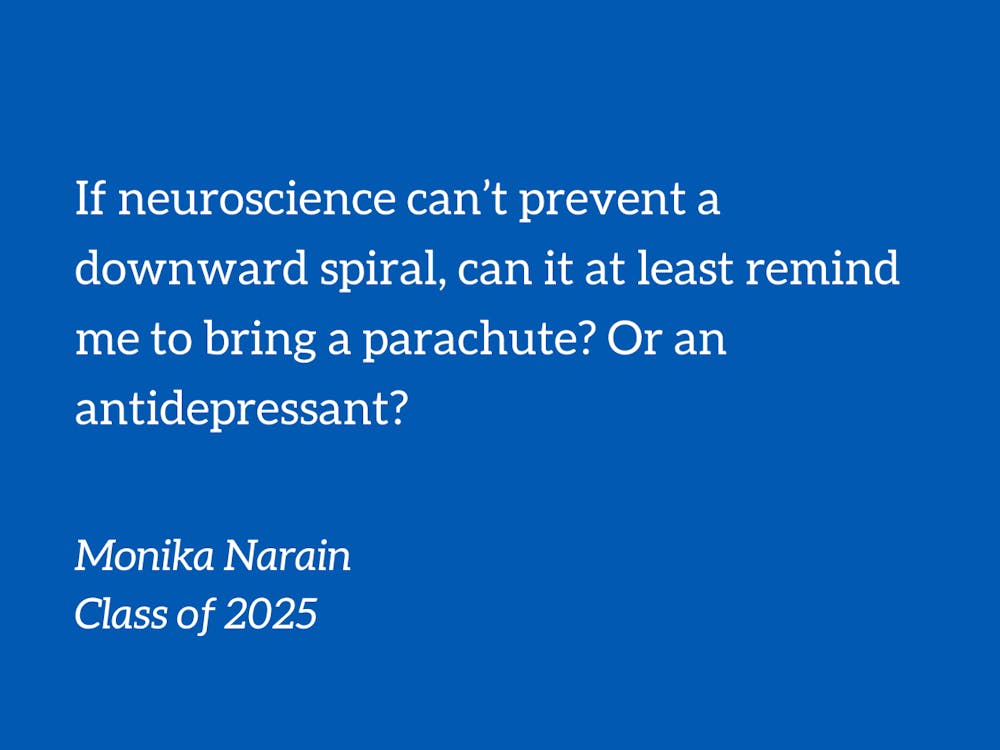I came to Duke to be a neuroscientist. And that’s still what I want to do, although it’s been a strange, twisted journey getting there. Although I still haven’t taken a neuroscience class here, and instead have been filling my cognitive reserves with other questionably relevant facts about matrices, screenwriting transitions, and, of course, lasers (because Duke Physics loves their lasers).
But taking this large break from studying neuroscience hasn’t brought down my love for the field; in fact, it’s only made it stronger. Spending the past few weeks in Los Angeles through the Duke in LA program attempting to learn the ins and outs of the entertainment industry as a naive 18-year-old has arguably exposed a lot more about the human condition than any neuroscience textbook I’ve ever read. I already feel like I’ve aged a good five years in less than a month, and am quickly coming to terms of just how sheltered my life has been as a mediocre suburban Illinois kid. How quickly I’ve been meeting people with dreams that don’t just occur during the REM cycle, people with potential you can’t measure in volts, and a lot of stoners. Like a lot of stoners.
I’ve always been fascinated with the question, can neuroscience make us more self-aware? Can studying the brain make us vigilant to the changes within our own? Because everybody’s listened to “what nobody tells you about being an adult.” Everybody’s read the articles or seen Karen-esque neuroscientists talk at length about our expanding frontal lobes as angsty teens, and how that substantiates the basis of our “erratic” behavior. But reading about massive brain change is obviously much different than experiencing it for yourself. Any neurological change is a process that transcends the five senses, because your senses themselves are rapidly changing. Not only are you capturing moments in more sophisticated environments, but you’ve also traded your biological machinery for more sophisticated equipment.
That’s where my question lies - if I know how my brain works, can I notice when that machinery gets replaced? When my worldviews get less grainy and take up less storage in my head, like a .RAW file? And will it help me in times of mental distress or disarray? If neuroscience can’t prevent a downward spiral, can it at least remind me to bring a parachute? Or an antidepressant?
Currently, neuroscience is the best way we can make sense of who we are in a semi-quantitative way. Neuroscience is the only field in which the object in question is studied by the very object itself. Neuroscience is for the self-curious, self-critical, and sometimes self-centered, those who want to know why they are the way they are, and more importantly, why their brains seem to feel “different” or “wrong” in some way. For the people who view personality quizzes and astrological charts as competition, not recreation. For the people who analyze and re-analyze every encounter, interaction, perception, movement, and emotion through a lens of equal confusion and curiosity. For the people who are frustrated yet invigorated by the fact that their whole worldview can be traced back to a single three-pound lump of tissue that looks like a big squishy walnut, because that’s too anticlimactic.
And that sums me up in my walnut-shell. It’s me repeatedly asking unanswerable questions, trying to rationalize irrational feelings, and thinking an MRI machine is going to help me with that. It’s seeking to unravel our complex wiring like an old pair of headphones, and developing evermore complex detangling methods to be published in Cell, or PlosOne, or Twitter. It’s getting infuriated as to why paying a stranger to hear my childhood issues is so effective in correcting a chemical imbalance, and scratching my head over what that imbalance even is. It’s demanding to know why simple chains of lipids and amino acids we learn about in freshman biology compel us to do the dumbest things. It’s wanting so badly to be a better student, a better friend, a better person.
I’m quickly realizing that the same desire for self-discovery and self-growth equally lies at the heart of so many artists’, writers’, and filmmakers’ work, which I probably should have figured out a long time ago. All this incredible content just trying to make a statement about the human condition, our collective mass of squishy walnuts, however profound, silly, or expensive. How it could cost the same to test a new oncogene therapy as it is to make the next Antman movie. It’s incredibly overwhelming, but truly empowering at the lengths scientists and Hollywood will go to get that point across. We’re all just trying to understand ourselves with the tools we know how to. We’re all just selfish people trying to become better people.
Monika Narain is a Trinity sophomore. Her columns typically run on alternate Fridays.
Get The Chronicle straight to your inbox
Signup for our weekly newsletter. Cancel at any time.

